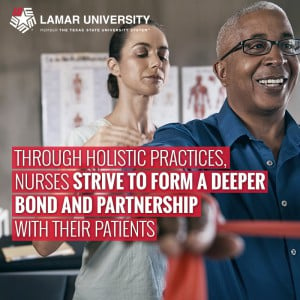Holistic medicine, frequently referred to as integrative health and medicine, has been steadily gaining traction among patients. And as more patients realize the benefits of this model, the need for nursing staff capable of providing such specialized care increases. Specifically, nurses would be well-served to develop a deeper understanding of the role of holistic health assessments as well as the overall benefits of holistic care.
What Is a Holistic Health Assessment?
According to the Academy of Integrative Health and Medicine (AIHM), holistic medicine is the “art and science of healing that addresses the whole person — body, mind, and spirit.” It utilizes a combination of traditional and alternative treatments and ultimately seeks to promote disease prevention through maintaining ideal health and wellness in all areas of life.
Holistic health assessments are integral components of patient care under this model. Composed of physical examinations and a series of well-designed questions, these assessments are used by nurses to evaluate how each area — body, mind and spirit — is affecting the patient’s overall health.
Nurses play a vital role in obtaining this information from patients and recording it in the medical chart. For example, the nurse may:
- Conduct a thorough physical examination (body).
- Encourage the patient to share their concerns about their condition (mind).
- Ask the patient about their spiritual or religious beliefs and how their disease has affected their faith (spirit).
By asking these types of questions and taking on the role of an active, empathetic listener, the nurse is able to establish a deeper relationship with the patient and better evaluate the entirety of their situation. This can lead to several positive outcomes. If the patient is able to discuss stressors that are affecting their health, for example, the nurse can help them identify appropriate coping mechanisms or direct them to other valuable resources like counseling.
Likewise, if the patient would benefit from spiritual encouragement or guidance, the nurse is able to swiftly recognize that need — one that might have otherwise gone unnoticed without a holistic health assessment.
The Origins of Holistic Nursing
The concept of holistic nursing is often attributed to the work of Florence Nightingale, a 19th century nurse who provided patient care at a British hospital during the Crimean War. She held a strong belief that a patient’s relationships and surroundings heavily influenced their overall health and wellness. She became one of the earliest healthcare advocates, and many consider her among the first holistic nurses.
In 2006, holistic nursing earned official recognition as a nursing specialty by the American Nurses Association (ANA). The specialty status meant that a scope and standards of practice specific to holistic nursing was also established.
Today, the American Holistic Nurses Association (AHNA) defines holistic nursing as “all nursing practice that has healing the whole person as its goal. This practice recognizes the totality of the human being — the interconnectedness of body, mind, emotion, spirit, social/cultural, relationship, context, and environment.”
Nursing and Holistic Care
As mentioned previously, holistic nurses strive to form a deeper bond and partnership with their patients. They listen carefully to the patient’s feelings and experiences and honor their values and beliefs. They seek to learn all aspects of a patient’s situation rather than simply focusing on their disease or illness.
In doing so, nurses in this specialty are more likely to incorporate the principles of CAM — complementary and alternative modalities — with mainstream, traditional treatments. The modalities are frequently classified into four domains, including:
- Manipulative and body-based practices such as acupuncture, dance therapy, massage, qi gong and aromatherapy.
- Mind-body medicine such as art therapy, guided imagery, meditation and neuro-linguistic programming.
- Biologically-based practices such as biofeedback, hydrotherapy, and nutritional counseling.
- Energy medicine such as prayer, reiki and therapeutic touch.
A fifth category — whole medical systems — applies to all four domains and includes homeopathy and osteopathic medicine.
By combining traditional and CAM philosophies, holistic nurses hope to achieve the highest level of healing for their patients’ physical, psychological and spiritual ailments. Nurses provide this type of care in a number of healthcare settings as well. A 2011 AHNA study showed that 48 percent of holistic nurses work in hospitals or clinics, 14 percent in private practice, 13 percent in an academic setting, and 7 percent in home care or hospice.
Furthermore, AIHM estimates that more than 40 percent of hospitals now offer inpatient integrative services, along with a significant rise in the number of services offered on an outpatient basis. Commonly used to treat cancer, depression and chronic pain, more than one-third of U.S. adults use some form of integrative health and medicine.
Learning More About Holistic Care
Given the growing popularity of holistic medicine and treatments among patients and healthcare organizations, current and prospective nurses are encouraged to learn more about this specialty. Lamar University’s online RN to BSN program offers coursework that covers comprehensive holistic health assessments. Students learn the skills necessary to properly conduct the assessment in today’s healthcare settings.
Learn more about online RN to BSN programs.
Sources:
Academy of Integrative Health and Medicine. (n.d.). Retrieved from https://www.aihm.org
American Holistic Health Association (n.d.). Principles of Holistic Medicine. Retrieved from http://ahha.org/selfhelp-articles/principles-of-holistic-medicine
American Holistic Nurses Association (2016). Retrieved from http://www.ahna.org/
Biography.com Editors (n.d.). Florence Nightingale Biography. Retrieved from http://www.biography.com
